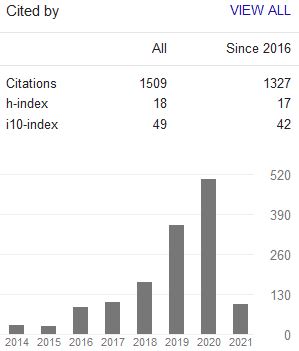REINTERPRETATION OF WOMEN’S DOMESTIC ROLES: Saleh Darat’s Thought on Strengthening Women’s Roles in Indonesia
Abstract
Keywords
Full Text:
PDFReferences
Ali, J. Abbas. “The Islamic Work Ethic in Arabia.” The Journal of Psychology, 126 (1992)
Badawi, J. A. “Islamic Teaching and Business.” O. F. Williams (ed.). Business, Religion and Spirituality; New Synthesis. Indiana: University of Notre Dame Press, 2003,
Breman, Jan. Keuntungan Kolonial Dari Kerja Paksa. Transl. Jugiarie Soegiarto, Christina Suprihatin and Indira Ismail. Jakarta: Yayasan Pustaka Obor Indonesia, 2014.
Van Bruinessen, Martin. “Kitab Fikih di Pesantren Indonesia dan Malaysia.” Pesantren, 6 (1989).
Carey, Peter. Asal Usul Perang Jawa: Pemberontakan Sepay dan Lukisan Raden Saleh. Transl. Pustaka Ahed team. Jakarta: Pustaka Ahed, 1986.
Houben, JH Vincent. Kraton and Kompeni: Surakarta and Yogyakarta 1830-1870. Leiden: KITLV Press, 1994.
Jamal, Ahmad Muhammad. Problematika Muslimah di Era Globalisasi. Jakarta: Pustaka Mantiq, 1995.
Khan, Md. Irshad. Empowerment of Muslim Women. Birmingham, United Kingdom: Koros Press Limited, 2012.
Kartodirdjo, Sartono. Pengantar Sejarah Indonesia Baru 1500-1900. Jakarta: Gramedia Pustaka Utama, 1993.
Kalibonso, Serena Rita. “Kejahatan itu Bernama Kekerasan dalam Rumah Tangga.” Jurnal Perempuan, 28 (2002).
Kumar, Ann. The Diary of a Javanese Muslim; Religion, Politics and The Pesantren 1883-1886. Canbera: Faculty of Asian Studies, Australian National University, 1985.
Kuntowijoyo. Pengantar Ilmu Sejarah. Yogyakarta: Yayasan Bentang Budaya, 1999.
Marcoes, Lies M. Wanita Islam Indonesia dalam Kajian Tekstual dan Kontekstual. Jakarta: INIS, 1993.
Mosse, Cleves Yulia. Gender dan Pembangunan. Transl. Hartian Silawati. Yogyakarta: Rifka AnNisa and Pustaka Pelajar, 1996.
Muhammad, Abdul Mun’im. Khadijah Ummul Mu’minin Nazharat Fi Ishraqi Fajril Islam. Al Hai’ah al Mishriyah, 1994.
Noerdin, Edriana et al. Potret Kemiskinan Perempuan. Jakarta: Women Research Institute, 2006.
Pakubuwana IV, Sunan. Serat Wulangreh Putri. Surabaya: Citra Jaya Murti, 1992.
Ranggawarsita, Raden Ngabei. Pengungkapan Isi dan Latar Belakang Serat Candrarini. Jakarta: Departemen Pendidikan dan Kebudayaan, 1991.
Reynolds, Katsue Akiba. “Female speakers of Japanese.” Feminist Issues, 1985.
Ricklefs, MC. War, Culture and Economy in Java 1677-1726: Asian and European Imperialism in the Early Kartasura Period. Sydney: Allen & Unwin, 1993.
Umar, Syaikh Haji Muhammad Shalih. Majmu‘at al Shari‘at al Kafiyat li al ‘Awam. Semarang: Toha Putra, n.d.
Salim, Abdullah. Majmu‘at al Shari‘at al Kafiyat li al ‘Awam Karya Kiai Saleh Darat; Suatu Kajian Terhadap Kitab Fiqih Berbahasa Jawa Akhir Abad XIX. Unpublished Dissertasion, IAIN Syarif Hidayatullah, 1995.
Steenbrink, Karel A. Beberapa Aspek tentang Islam di Indonesia Abad ke 19. Jakarta: Bulan Bintang, 1984.
Shihab, Quraish. Membumikan Al Qur’an: Fungsi dan Peran Wahyu dalam Kehidupan Masyarakat. Bandung: Mizan, 1999.
Sotiropoulou, Irene. “Women in alternative economy or, what do women do without official currency.” Women's Studies International Forum, 47 (2014).
Baried, Siti Baroroh et al. Pengantar Teori Filologi. Jakarta: Pusat Pembinaan dan Pengembangan Bahasa, 1985.
Suhandjati, Sri. Islam Menentang Kekerasan Terhadap Isteri. Yogyakarta: Gama Media, 2004.
Sutrisno, Sulastin. Surat Surat Kartini: Renungan Tentang dan Untuk Bangsanya. Bandung: Djambatan, 1979.
Tjandrasasmita, Uka. Kajian Naskah Naskah Klasik dan Penerapannya bagi Kajian Sejarah Islam di Indonesia. Jakarta: Puslitbang Lektur Keagamaan, 2006.
Umar, Nasaruddin. Argumen Kesetaraan Jender: Perspektif Al Qur’an. Jakarta: Paramadina, 1999.
Yusof, Rohana. “How Religious Values Affect Entrepreneurial Behaviors Among Muslim Businesswomen in the District of Pendang, Kedah.” The Niew Journal: the Voice of the NAM Woman, 3 (2011).
DOI: 10.15642/JIIS.2018.12.2.195-218
Refbacks
- There are currently no refbacks.
Indexed by:
Journal of Indonesian Islam (ISSN 1978-6301 and E-ISSN 2355-6994) is published by the Postgraduate Program (PPs) and the Institute for the Study of Religion and Society (LSAS), State Islamic University (UIN) of Sunan Ampel Surabaya.
Journal of Indonesian Islam by http://jiis.uinsby.ac.id/index.php/JIIs/index is licensed under a Creative Commons Attribution-ShareAlike 4.0 International License.
Copyright ©2020 State Islamic University (UIN) of Sunan Ampel Surabaya. Powered by Public Knowledge Project OJS.







